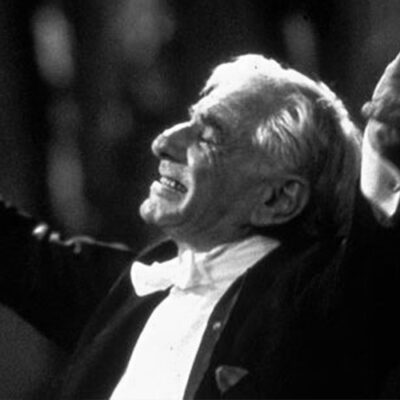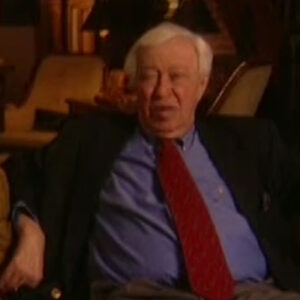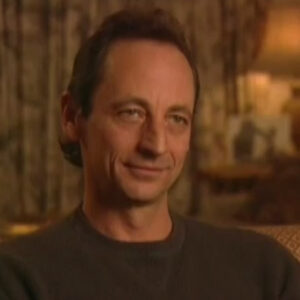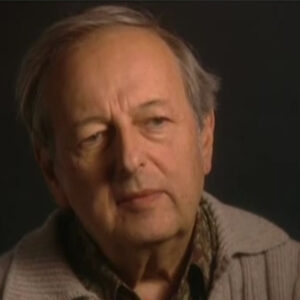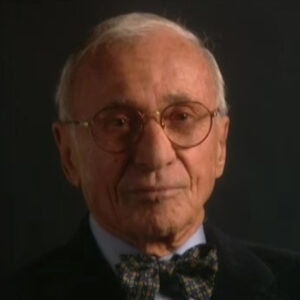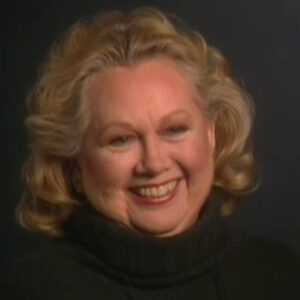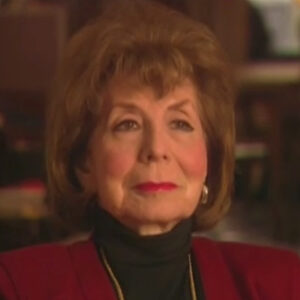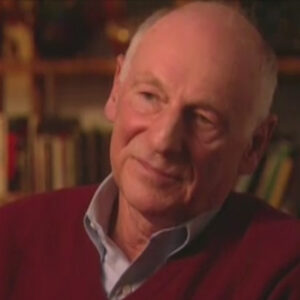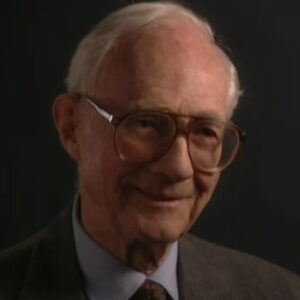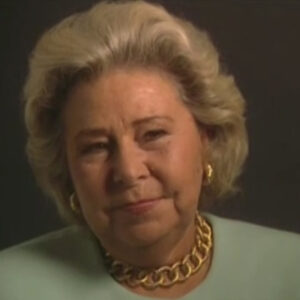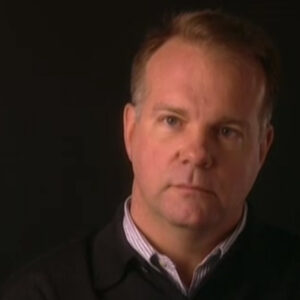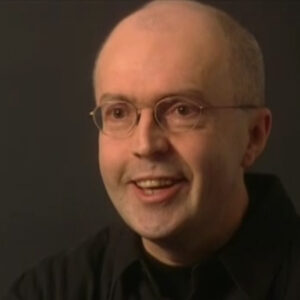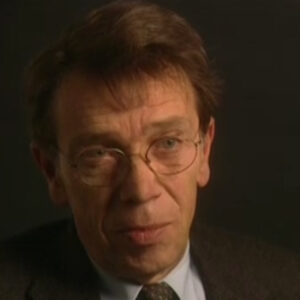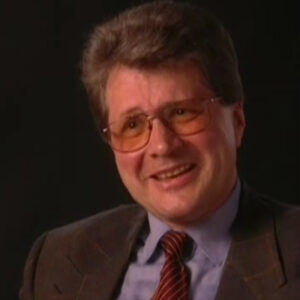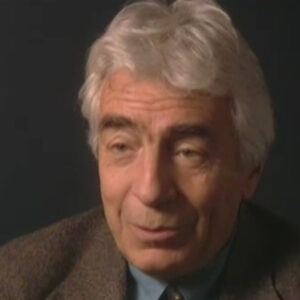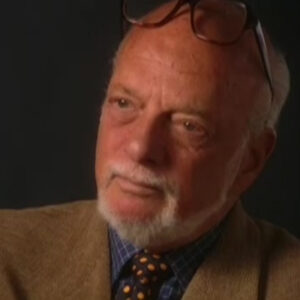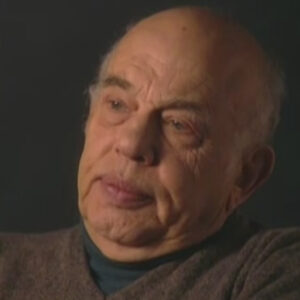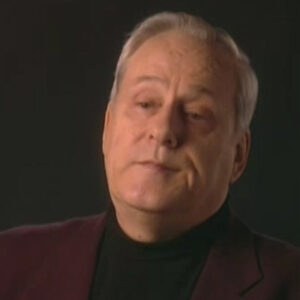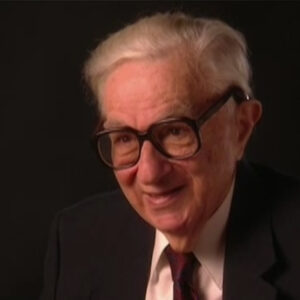Speaker Let’s start at the beginning. How did you meet Lenny?
Speaker Oh, I think I went out to buy a quart of milk or something for my mother and went to the local delicatessen.
Speaker And there was. A young man, very handsome young man who was performing for the benefit of Mr. Lesson, the owner of the delicatessen, and he was he was doing a number. He was he was imitating Roosevelt, giving his I hate war speech and doing it brilliantly. And that was the first time I saw him. And then we we didn’t need exactly, but we saw each other. And then later we would see each other in the various hangouts, courteous places where courteous kids were. And we got to know each other and. That was it.
Speaker Maybe you could just give me one sense of the me later, which is it was when Lenny was a student.
Speaker Lenny was in his let’s see, he was at the end of his first year at Curtis when I first saw him, although it was winter, I guess it was not the end, because I remember him being in a very, very big coat that looked much, much too big for him. It was all kind of wrapped around with a belt. And and then I must have seen him at Curtis events, perhaps. But we our friendship didn’t really begin until the following the following year when he came back from from his summer for his last year at Curtis, making that year when he came back from Tanglewood. From Boston. Yeah. Mm hmm. By the way, he lived above the delicatessen. That’s where he lived. And it was a kind of a rooming house, I guess. And those were hated quarters, I think. And then the following year, he moved to more. One can call them palatial, but much, much bigger quarters on Wall Street, which I never saw where he lived over the delicatessen, but I. I didn’t know where he lived. How did your friendship develop?
Speaker Uh. We don’t know, he came and sat next to me at a concert at Curtis one day and then we became friends and somehow we I don’t know, he began to come to the house and he was made very welcome by my mother, who, as everybody did, people loved him or hated him and our family loved him. So he became a fixture in our family, coming for dinner and so forth.
Speaker It was a family.
Speaker Yeah. Yeah. Lenny, Lenny needed that, I think. Was that he needed.
Speaker Well, I mean, I think he he needed the warmth of a family always. I think that was very, very important to him. And while he had other ideas and lived all kinds of lives, I think that that aspect of his life was very central.
Speaker Did mean I don’t mean to get into this cycle analysis here, but.
Speaker I read in enough places that he where he found that in other people’s homes, where he was really he made it his own because he didn’t have it to do so. Would you feel comfortable? Well.
Speaker I know that he had this incredible closeness to his sister and he talked a great deal about her, I think there were yeah, I think there were difficulties at home. I think he had a difficult father who didn’t understand him and didn’t understand his talent and his need for music, his love of music. He had other ideas for him and.
Speaker To be in a kind of familial environment where people really supported what it was that he loved and wanted to do, I guess was nourishing for him.
Speaker Just talk to your mother. Well, my mother my mother was a remarkable woman. She was a very handsome, attractive, intelligent woman and very warm, very. Very generous, and she took to Lenny and Lenny took to her, and so it made it it sort of doubled it doubled the attraction for him.
Speaker I think that there was the daughter and there was the mother and my brothers who liked him very much. And we had a piano and we adored music.
Speaker And so it was a place where he felt very much at home and. We had a lifelong friendship that was the that was the major are we on? That was the major thing for for me, that our friendship was great enrichment to my life. And I hope in some small way, you know, that I brought something to his life. It certainly it certainly was a life I valued enormously. And I think all of us who had the privilege really of knowing him have, you know, have been enormously enriched, even though there were ups and downs, I mean, which there always are.
Speaker But anyway, yes, I was I was 16 and I was studying the piano. I didn’t have any particular ambitions at that time about being a musician. But Lenny took an interest in the fact that I had this overwhelming passion for music. And that’s something we shared. And I should have said about him at the outset that it was very, very clear that he had this extraordinarily seductive personality. I mean, it was something that hit you right in the face immediately and with a combination of seductiveness and flamboyance. And he was a big show off and, you know, thank heaven, because that’s what made him what he was and. He was he was fun to know, I mean, being with him was fun, it was exciting, it was scintillating. And if you dug, you were crazy about it. If you didn’t like him, that was something else.
Speaker And there were certainly people who, you know, took exception to the fact that he was a show off and that he was too smart and too good at what he did.
Speaker But that was not the case with with me as I was going to ask you about that at Curtis. No, he I think you made reference to himself that he had a difficult time. Curtis Yeah. I think people he was.
Speaker Yeah. If you could talk a little bit. Well, it was a staid place. It was a very staid place. And Lenny was a bombshell.
Speaker So I think.
Speaker People people took exception to that and also, as I said before, I think the fact that it was so fantastically gifted in so many ways as a musician maybe was something difficult for a lot of people to to accept. You know, each every student at Curtis was good at what he did. You know, he was a pianist who is a violinist and they were, you know, budding stars, many of them.
Speaker But Lenny was great at so many things. And plus, having this extraordinary personality and the ebullience and enthusiasm he brought to everything he did was was overwhelming. So, you know, some people were jealous and people resented it. They wanted him to behave in another kind of a way and.
Speaker He didn’t conform, stepped on that the idea of not conforming is an interesting one, but there was also the unusualness and he could talk that it would be great have somebody who achieved the stature musically to really come in these dreams and things like that had, in fact, gone to Harvard.
Speaker Mm hmm. High School Musical only went to conservatory after a Harvard education, which was pretty unusual with Prematch.
Speaker That’s right. I think it’s just. Yeah, we just. Yeah, no, I think it’s a measure actually of his gifts that that was that that was the very fact that he came to it late and achieved what he achieved so quickly. I mean, one wonders if he had been given all the advantages of a musical education as a very small child.
Speaker Whether that would have made any difference, I don’t know. Perhaps to him as a pianist, it might have made a difference, because what you do is a very young child when you’re learning an instrument is very, very important. But God knows, I mean, he was a wonderful pianist. He was not a major virtuoso pianist, which he might have been had he started earlier. I don’t know. He played well enough for his and most purposes that I couldn’t think of. I mean, he didn’t need to play the Rachmaninoff’s Third Piano Concerto, so the right.
Speaker But because he cared.
Speaker And if you could give this back to me and said because he came with a Harvard education into a conservatory where most of the students had been studying, only uses whatever that he had, he was desperate for people to talk to, had a range of interests. That’s right. And that which I think contributed to his loneliness, which contributed to his looking for the right type of well story.
Speaker Well, yes, I have.
Speaker Yes. I think he did feel very isolated in Philadelphia. And the people he knew who. Who sensed the breadth of his interests or who understood? I mean, I was a kid, you know, and I mean, he he opened up doors for me intellectually because I didn’t know these things. You know, he read poetry to me and we talked about things that I knew nothing about.
Speaker I mean, he really opened up whole areas for me. And I think finding people. Was there probably were many people there in Philadelphia who could have gone along with many intellectually, but he was, after all, studying how to prepare his lessons for venga over and learn his scores. And he was working very, very hard.
Speaker So I think actually there wasn’t even time for him to to find the kind of intellectual companionship he he required.
Speaker And then he was only there for, what, two years, so he was off in a way, um.
Speaker I don’t know what more to say about that, really, OK, except that nobody could do this to but the fact that he came, he was unusually courteous because he had come there with a higher education.
Speaker Certainly was. Yes. Yes. And that was yeah. That was you talk about that. It was unusual.
Speaker Well, yes, it certainly it was unusual that anybody who came to Kurtas came at that age to begin with, which was already old for Curtis’, where people came, you know, six years old, seven years or whatever. But to have come from Harvard with a degree from Harvard, I don’t know if there was anybody else that has changed in recent years.
Speaker I mean, you have many young musicians who who have that. I mean, Yo-Yo Ma is a Harvard graduate. And, you know, it’s a more common thing now.
Speaker Not that it’s that common that musicians have that kind of background, but it certainly was most uncommon, I think, at the time. And I don’t know how much they liked it at Curtis, really, you know, how much they thought that was a an enrichment of a of a person?
Speaker I think they were so single minded about training virtuosos that.
Speaker That was not an issue for them.
Speaker Did I talk to you about his teachers?
Speaker Yes, but I have to say it’s all in such a remove, you know, I mean, it’s it’s I hate to say how many years later it is.
Speaker Yeah, I think it was. I think it was. I think he was he was somewhat scared of anger over.
Speaker Lenny had a way of making fun of everybody that that he had to deal with in his life as far as tutelage was concerned. I remember even just making fun of Koussevitzky, except that he took me to a Boston Symphony Orchestra concert in Philadelphia. And for the first time, Lenny was like a little boy to me. I mean, I always looked up to this this glamorous figure, and suddenly there was this shy little boy in front of me in front of Koussevitzky.
Speaker So, yeah, I think he made fun, a little bit of Ryner and a bankrobber, but he respected them enormously and certainly acknowledged learning a lot from them. Of course, he adored Koussevitzky. So did he.
Speaker In hindsight, it’s easy to see that through because obviously Major Metropolis Savitsky Copeland to a lesser degree, Bryner, aside from the fact that they taught him a great deal, that they were in a sense father figures and the desire to please them.
Speaker Influence many decisions he made his life. But was that clear at the time that that he was seeking in these men something he wasn’t getting from his own party?
Speaker Well, that might have been clear, but not necessarily to me, because then. Oh.
Speaker I know this is hard to do. Yeah, yeah, Technik Britain’s relationship with.
Speaker Yes, he had he had serious professional relationships or a student teacher relationships with very important musical figures of our time and that he might have been, yes, searching for a father figure seems sort of obvious. What I thought about it at the time. I don’t know. One thing I know is that when his father came to Philadelphia and Lenny brought him to the house and his father said to my mother, I don’t know why Lenny wants to be a musician, he could come into the business and he’d make a hundred dollars a week. You knew that there was a father who had no conception of. Of who his son was, and then, of course, many years later, there was the famous story of Mr. Bernstein saying, how did I know he was going to be Leonard Bernstein?
Speaker So did they ever talk to you about it, about his father? Yeah. Yeah, I can tell.
Speaker Well, yes, Lenny did talk about his family a great deal. And I think he suffered very much from his feeling that he was not understood by his father. And I think as a kid, he lived in a certain terror of his father. And.
Speaker How that affected him is, you know, I you want to get into a psychoanalysis of.
Speaker Terror fear. Yeah, is.
Speaker We’re not being supportive of one thing. Why would that produce fear? What was your fear?
Speaker Well, I don’t really know. I think his father, the way children can be terrified of their parents. I guess you have to speak to Shirley about that because she would know much more about it than I. Oh.
Speaker Fathers can make their children afraid of them by sternness, by lack of approval and, you know, by annoyance being perpetually annoyed with. With them. Myriad ways that parents can make their children frightened of them.
Speaker You played together with Lenny, you talk a bit about what kinds of music.
Speaker Yeah, well, we were involved a lot with contemporary music, and we used to play the Hindemith Forehand Sonata.
Speaker Hindemith was very big in those days.
Speaker And I remember Lenny once came with a huge score of Billy the Kid of Copeland. It was in in the old days, there were accordion pleated scores, you know what those things looked like and you open them up. And so we played together there. And then we lived on the third floor in an apartment building in Pine Street in Philadelphia. And when we finished playing, we took the score and we took it down. I stood at the top and Lenny walked down the steps. And with the horse, we spread the score all the way up to the first floor just.
Speaker Pranks here. I think friends with company.
Speaker Yes, yes, he did talk about Copeland, he admired him enormously. He talked very much about Copeland. I think Copeland was. Very, very big. Well, one knows that major figure in his life and there were I think there were some problems later on when money it was established as a musician, as a very famous musician. I think there were problems with Copeland, but then there were no problems. I think it was pure adoration on his part, even though there are stories of his having criticized certain things and some pieces of Copeland. I mean, he would do that. And then he was brash, to put it mildly. But are. No, I think he had a genuine, very genuine and always, always spoke. Through through the years, I don’t think has his admiration of Copeland as a composer never changed what you alluded to problems later? Well, I’m not the person to talk about that. They they ran into some kind of problems together, personal, personal problems. And I mean, there was a I think there was a cooling period between them and which they overcame whatever it was.
Speaker What kind of a friend was learning or thinking specifically about.
Speaker This story he told about is helping you with your homework so that you can go to the concert row yourself.
Speaker He was an incredible friend and he was through it throughout his life.
Speaker I think there are many people who will attest to his enormous generosity as a friend in every way.
Speaker And he once said that if he could have all the money back, he’d loan to people. He’d be a rich man. But aside from money, you know, his time. I mean, even though he was.
Speaker The very famous, incredibly busy, incredibly people were, Adam, on all sides, you know, when he made time for you, he really made time for you.
Speaker And he he heard you and he he listened to you. And he he cared he cared very, very much about his friends. And he was a big part of his life, his connection with people, of course. You talked to.
Speaker I think about Leidy’s fits of depression and complex syndrome, which he experienced just his whole life.
Speaker Can you talk about the impact of that?
Speaker Well, I think anybody who knew Lenny at all well throughout his life can talk about those depressions, which I think got. Deeper and deeper, even as he got older. But when I knew him, the depressions were not severe, but I think his expression of conflict was already this was something already that he talked about. He was already conflicted about. The various ways his talents were going, you know, there was going to be a pianist where he’s going to be a conductor, whether it’d be a composer, I mean, although actually talk about composing was the very least it was. And then then he had his private demons, and I think he was already conflicted about. About himself.
Speaker In his. Sexual orientation. Uh. And suffered very much about these things, did he share that with you?
Speaker Yeah.
Speaker Do you feel comfortable? Well, when Lenny talked to me all those years ago, he certainly never dreamed that I would be talking to an audience of 10 million people.
Speaker I think I care to say any more about it than that.
Speaker Did you have Felicia? Well, yes.
Speaker Uh, and I loved her very, very much, she was the most amazingly wonderful woman. Beautiful, intelligent, witty, kind, marvelous woman.
Speaker And that happened. Well, yeah, I mean, yes and no. I guess am I on television now? Are you have to talk to people who you know. He loved her, he loved her very, very much, and I’m sure they had much happiness in their life together. Well, maybe it’s a lot of unhappiness. I mean.
Speaker What are some of the issues that you spent time together?
Speaker Yeah, with her, yeah. Yeah.
Speaker What are some of the anecdotes or particular.
Speaker Well, the one well, one one nice thing. I used to go to the apartment because I taught Jamie and Alexander for a while and I saw I would be there sort of regularly and very often after the lessons they’d have me, you know, we’d sit around and have drinks or sometimes I’d have dinner there and. They were very excited after having been at the White House, and they gave me a whole sort of preamble about their excitement about what they were going to wear and the back and forth about who was going to wear what.
Speaker And then Felicia told the story of Lenny sitting in Kennedy’s rocking chair. And I mean, they were you know, this was a marvelous experience for them. And I mean, here was Lenny being who he was. And literally at that point in his life, on top of the world is, you know, he was.
Speaker A very, very great figure in the music world, but it was a little bit like going backstage to be Koussevitzky, you know what? He was with the president.
Speaker I think he felt the the wonderfulness of of the occasion.
Speaker Although, again, I was reading Humphrey’s book last night and Eugene Istomin tells of being at a White House thing with with Lenny. And Eugene said about himself that he was so, you know, he was absolutely awestruck at being in the presence of of a president, whereas Lenny said something to which they were having some kind of political conversation. Lenny said something to Kennedy about the fact that he didn’t see the forest for the trees. And Eugene describes Kennedy’s eyes sort of, you know, narrowing. And that’s wonderful.
Speaker Yeah, it’s a nice story.
Speaker Did he read it?
Speaker Friends killed Kennedy and. Yeah, well, you have to ask somebody else whether they were friends. I don’t know if they were friends in the sense of friends, you know, he was with when they heard the news of Kennedy’s assassination struggle.
Speaker And he said, yeah, yeah. Because they were friends. Well, I knew him well. Yeah. Well, I guess they had some.
Speaker You know, I don’t know what the nature of their connection was. There must have been some connection. Certainly I know that. At the reception after Felicia’s death. Jackie Kennedy was there and very warm and. So, yes, I don’t know how ongoing it was or how much they went to the White House, I didn’t keep track of that, but I.
Speaker Yes, they had some kind of vital connection with the Kennedys.
Speaker Well, yeah, because he came across.
Speaker Well, no, I didn’t know. I got to know Paul later. I got to know Paul in New York and then in Paris. I used to see Paul, but I didn’t see Paul much in connection with Lenny. Although Lenny talked a lot about Paul to me in Philadelphia. He adored them. Paul and Jane were big figures in his in his life at that point. What would you do? Well, I think Paul Paul already was a glamorous figure for poor people. He was very handsome, very smart, very distant, very kind of mysterious, talented.
Speaker And.
Speaker Jane Boles was kind of an incredible spirit, very, very intriguing kind of woman, very smart and very sly and interesting. There were an interesting couple and and Lenny was very taken with them, really. I think they were taken with him. Yes, very, very taken with him.
Speaker Did that friendship. Oh, I don’t know how, you know, balances change. I mean, Paul was already kind of a famous. Well, I think he was already quite successful composer for for theater. What I don’t remember, Ned will be able to tell you more about this. And and he was still the student. But then I think as the balance shifted and Lenny became more of the great figure and I think really until Paul became known as a writer, his his reputation was sort of circumscribed. You know, as a composer, whereas as a writer, he had a he became a nun, certainly in more recent years, he became something of a of a cult figure. What happened in regard to Lennon and Paul is when it became more famous. I don’t know. I have a feeling that maybe things changed.
Speaker Between them.
Speaker When Lenny was graduating, he performed brilliantly, eight lessons in everything when the award shows, I don’t know what that was about, and he was somewhat uncertain about his future. Could you talk about that?
Speaker Can you talk about how he performed the surprise of not being voted a student most likely to succeed or what?
Speaker I really, really can’t. I’m sorry that I mean, my memory is is dim about that. I think I was more concerned with the fact that he was leaving. He took off. And I think that was. You know, the loss, the loss of of. Ah, our friendship, although it didn’t turn out to be that, I mean, I never anticipated either that it would be a loss, a permanent loss of friendship, but I think that was what preoccupied me. And I just don’t remember the details of of how that was for him. And he also he was very excited. Copeland was coming and they were going off to Atlantic City. And that seemed to be the. The big thing, because Copeland was the big man in his life at that time, so what were you worried about? Just to celebrate Lenny’s graduation? And so they took off. I saw them off at the station and off they went and let me know what he was going to know. I mean, what he was going to be doing, no is a matter of fact, I think he went back to Boston and tried teaching piano, as I recall, sort of vague about this. And then he went down to New York and I think he got a job at some publishing company doing transcriptions or something like that for 25 cents an hour.
Speaker Written under a pseudonym. Yeah. Oh, that was another that’s a that’s a memory that I have that was even more predominantly my mother’s memory of sitting up a whole night with Lenny when he was struggling over the fact that Koussevitzky wanted him to change his name.
Speaker To Leonard Burns horrible name, and he concluded, after a night of soul searching that it was something he couldn’t do.
Speaker Why did it? Why? Because of this morning.
Speaker I think Koussevitzky felt that with a Jewish name like Leonard Bernstein, he wasn’t going to get any place, but he got someplace sort of Vladimir Horowitz.
Speaker I mean, Rubinstein Hafitz, I Larry David, he gave it.
Speaker Well, anything I think anything that Koussevitzky wanted was something he had to give consideration to. Yes.
Speaker Now, there are all these wonderful pictures of you and with Lenny in those early days in New York or early days, I mean, through the 60s all day. Yes. And there were a lot of interesting parties and people, celebrities that filtered in and out of this life. Describe that aspect of Lenny’s life and your place in it.
Speaker Well, my place and it was very small. I mean, I was I I had a sort of what’s the word? I could go to the Philharmonic concerts whenever I liked. I mean, Lenny had arranged that I just go backstage, I come in so I would I would go often. And then there was a kind of well, years later, it was pandemonium. In those years, there were his friends who would congregate after the concerts in his room. And then very often we would go out to restaurants or, I don’t know, watch belly dancers or depending on what the current the current interest was. And and Lenny was always very, very up after performances and wonderful to be with. And what can I say? It was tremendous fun. It was. And then.
Speaker Later on.
Speaker Gee, I remember one concert, but this is already. Those were Carnegie Hall days and the Lincoln Center days. I remember one concert where Felicia had. Because at this the I’m trying to remember what it was she did, the Saint Sebastian, I think, of Debussy and Elizabeth Taylor was there and Richard Burton was there. And when she came off stage, Richard Burton lifted her up in the air. I’ll never forget that sight of little Felicia being lifted up by Richard Burton. And Lendee described to me later on the fact that excuse me, that the four of them had gone out together and Burton and had decided they were the two sexiest men in the world, which I suppose they were.
Speaker You described being in the green room after a concert with Lenny and what that was like.
Speaker Well, wait, wait, wait, wait, wait for them. Or at least what I think what’s interesting here, real life waiting for.
Speaker Waiting for.
Speaker Well, it used to be the in the earlier days, it was you know, there’d be these sort of inner circle who you’d sit around and wait while Lenny saw a fair number of well-wishers or, you know, people who wanted to speak to him for one reason or another later on when Lenny would after he Lenny left the Philharmonic.
Speaker And he would come to guest conduct, then the lines were around the block and people would wait in line for hours just to, you know, get a kiss or not a kiss or whatever and. So that, you know, I mean, he was incredibly, incredibly sought after.
Speaker How did he ever seem surprised by the celebrity?
Speaker I think maybe at the beginning.
Speaker I think he got used to it very quickly, oh, maybe at the beginning, I think maybe he was surprised. I mean, when he got plummeted to the top. Is that the right word?
Speaker Plummeted is down, elevated by his performance to the impromptu performance, the famous performance with the Philharmonic when he substituted for Bruno. Walter and I saw him shortly after that and.
Speaker He was very, very excited at how well he had done and how everything was just the way he always dreamed it should sound and so forth, but I think yes, I think he was, if not surprised, at least pretty excited, pretty excited about what was happening properly at all of how far he had come from his background.
Speaker Yeah, Apoorva.
Speaker No, no. It was a it’s not a question of background, really. I think just. Well, I think I was in there.
Speaker I mean, if you are part of the music world, we would be great if you could talk a little bit about this and the fact that he was American. The fact that he was Jewish. The fact that he was as young as he was and and hadn’t come, in a sense, through the normal groups, that a conductor comes to finally be the head of the New York music director for the well and the fact that this was the first and that the orchestras generally look to Europe to feel.
Speaker Oh, absolutely. All of the staff. Yes. And so the intimacy and get used to the idea of American trained composers and conductors and trained musicians, you know, that was a phenomenal achievement. It was you know, if you could talk about that, it was so great.
Speaker Well, uh.
Speaker I think I think that that that Lenny sensed his own greatness in himself, I think there was always that conviction inevitably. I mean, you couldn’t be so as gifted as he was without thinking there had to be some outlet for this in the world, you know, and after courtesy experience certain setbacks because he, you know, the opportunities didn’t didn’t arise. But then as the opportunities arose and he was able to take advantage of them so brilliantly, then this thing happened. I think the fact that he he was. Yes. And this is a very unique position of being a young American, Jewish, if you will, a musician who was quickly making it to the really to the pinnacle of musical success had to be a very extraordinary thing to live with. I mean, to to know that that you were in a sense.
Speaker Almost a pioneer in this whole musical adventure of being a big time conductor in the United States, where the worship of Europe was the and still really is. I mean, it’s. When orchestras go to find conductors, they still tend to bring them in from Europe, as we know.
Speaker So before letting the famous American conductors? I don’t think so.
Speaker They like all the. No, no, absolutely not. I can’t think it’s fair to say when he was. Oh, absolutely. Oh, absolutely.
Speaker I think Lenny was the very first I’m a really American conductor of of stature. I can’t think of any major orchestra that had that had an American conductor. Oh, no, it was it was an extraordinary event, did did Larry did the celebrity of that? Scale change. Yes.
Speaker Yeah, it’s celebrity. Yes, I think the more celebrated he became. Yeah, I think the more he inevitably. Well, the more the more aware of his power and. Using his power and. I think maybe it made him, especially in the last year, made him in some way more difficult.
Speaker More difficult to not to approach, but to. Well, to communicate with in a certain way. I don’t know how much in his last years he was I may be wrong about this, but it seems so to me that certain kinds of conversations you couldn’t have with him, other kinds you could.
Speaker But things were very he controlled everything in a way that made a very free.
Speaker Give and take. Problematic, I think.
Speaker Can you elaborate?
Speaker In what way? Well, what kind of conversations? Well, almost about anything and politics, music. I mean, he his ideas were the ideas that that mattered. And I don’t know how much he was interested or I may be wrong about this, but how much he would even listen to. I mean, he had his notions of what was the very best and there would be pronouncements.
Speaker The greatest poet was such and such, the greatest composer with such and such, the greatest politician with such and such. I mean, and it was hard, you know, what could you do there? He was he was Leonard Bernstein. And what are you going to do, contradict him? You know, I mean, you could, but it didn’t matter.
Speaker How do you think his lifestyle affected Leonard Bernstein, the musician?
Speaker Well.
Speaker I think his lifestyle gave us less of him than we would have had if he had had a different one. I mean, I think he would have lived longer.
Speaker But. He lived the way he wanted to live, and that was his. Choice, our laws.
Speaker I mean, it’s been suggested by some that you have that kind of list.
Speaker I mean, the discipline that goes into the act of composition requires tremendous discipline. And that had already been able to. Focus more of his energy on that as to of wildlife that he was living the American. Do you think that?
Speaker Well, I think it’s just a question of time. I don’t know about discipline. I think Lenny had all the discipline he needed. I mean, he knew how to work, obviously.
Speaker Oh.
Speaker Whether you know, whether he should have not stayed up late, going to parties and written another piece, it’s, you know.
Speaker He wrote what he wrote and. He gave us what he gave us and he wanted to do certain things in his life, he wanted to do a great deal in his life, and and he did it. I mean, one, I don’t know how one can complain about that, but that was certainly facilitated.
Speaker Yeah, but he doesn’t seem to think, well, he would have lived with that in any case. I mean, if he had thrown everything, he it was too multifarious, the whole thing. There were too many things he was good at and not only in his work, but in his, you know, in his relations with people. And he needed those relations and.
Speaker He was he was torn, he was torn all over the place, so I think considering that and considering. How much agony he must have gone through because of the kind of life he did lead, that I think it’s miraculous that we have everything we have.
Speaker Let’s go back to those years of the 60s, the 50s and 60s, really a glorious period.
Speaker I mean, in terms of his success and his accomplishments and what he was able to write, a story like moratorium and candid, candid.
Speaker The contrast between that and the sort of lack of critical recognition that he got from the critics of the time, we sort of mattered. I mean, it’s a battering he got from a couple of them.
Speaker You mean for his conducting or for his composition?
Speaker Paul-Henri Long? Yeah, yeah, yeah. I mean, that they’re contrasting and they you know, he was revered and. Yeah, yeah, yeah, yeah. He’s got a degree and yet the press just wouldn’t give him the time of day. Yeah. You could talk about that contrast. That would be interesting and how it affected Lenny.
Speaker Lenny was deeply affected by the fact that the critics were often so.
Speaker Down on him, and I think there was something similar to the critics being down on him then as to the attitude that they had toward him at Curtis. Some of the people at Kurtas, in other words, there were always people who adored him or people who didn’t adore him and were offended by him, and for whatever reason, I think some of those critics were fell into that category. I mean, they simply were not going to give him the time of day, that’s all. And yes, I remember there was one there was one article that Paul-Henri Long wrote for the then New York Herald Tribune. I remember being there and big conversations about whether people should write to the paper. I mean, the thing was so unfair. We so.
Speaker I mean, obviously, somebody who was just unwilling or unwilling to make that, you know, to acknowledge this extraordinary thing that was there, which was his gift, you know.
Speaker Oh, you think it was primarily because of Lenny’s association with Broadway?
Speaker No, I think it had a lot to do with the flamboyance of his personality. I really do. I mean, the fact that he moved so much on the podium, there’s a very charming story about Montre, who was at Ravinia when when he gave his first performance there.
Speaker And the manager of the orchestra came up to Montana and asked him how he liked what he thought of the young Bernstine. And he looked up at a very kind of very twinkle in his eye. He said, At my age, I must learn to dance. So, you know, there are people that like that and people who didn’t like that.
Speaker And I don’t think they listened so much as. They looked and they and Lenny was I mean, he was a big presence and everybody knew the kind of person he was and. Critics have a certain power, and I think they wanted to put the screws in. Nothing nothing could stop him, you know, he was kind of sheltered many years later, I guess some kind of defense for himself said something like, your critics don’t make a career out.
Speaker Right? Right. Yeah, right. Yeah, right. Of course. Right. It’s hard to believe. Yeah. Well, it hurt him personally. I think it did hurt him that he them. Yeah, sure.
Speaker You had Lenny, you know, he he he expressed his pain at that. But any artist doesn’t like no artist likes a bad review.
Speaker You know, it’s it’s hurtful. So yes, I think he was I think he was deeply hurt by the fact that he he would get a bad press. But what you know, what do you do about it? There’s nothing you can do. It’s you keep going, you do your work and other people will appreciate you and people who don’t.
Speaker In terms of this is composition, I do think Lenny raised himself.
Speaker Well, I think Lenny was I think Lenny was insecure about how he rated himself.
Speaker But.
Speaker I certainly think he knew what his strengths were.
Speaker And I think maybe every artist is insecure about himself and doesn’t know how to read himself, and that’s another reason why the bad reviews hurt, because any any assurance you can get from the outside world, you know, whether it’s applause or whether it’s a good review or somebody coming and telling you, yes, that was a good piece you wrote or a beautiful performance you played.
Speaker Oh, artists need that. I mean, how can you be sure, you know, you’re you’re starting from nothing when you’re a composer and you have to.
Speaker Fill up a page with notes, it’s a very hard thing, so. But what what aspect of his and his musical talents is achievement?
Speaker Do you think it mattered the most to him to excel? And how did he?
Speaker I think the composition I, I think I, I think the closest to his heart I may be wrong, but I certainly it makes sense to me that the thing that would be closest to his heart as an artist was his his composing, because recreating somebody else’s music well is a very wonderful thing, is certainly not the same as creating your own and.
Speaker I think that that’s what he valued most.
Speaker And of his compositions, what do you think will land? What do you think will be in the repertoire?
Speaker Well, it’s hard to say.
Speaker I think he’s I mean, aside from the very obvious wonderfulness of his Broadway things. I mean, it’s what I personally happen to love. It doesn’t necessarily mean that it’s you know, I think there were many wonderful compositions. I love the. I love the mask of the age of anxiety, I think it’s one of the greatest things written in 20th century. And I love Serenade and. I’d like parts of a lot of his pieces, I love a lot of his piano pieces, I think the anniversaries are wonderful. Um, it’s very hard for me to say. I would think that there is enough value in everything Lenny wrote that that it would be remain part of the repertory of 20th century music.
Speaker So I’m very familiar with his music. Can you talk a little bit about some of the autobiographical subtext that appeared in his music to be specific about?
Speaker I don’t know if I can talk about that.
Speaker Oh, that junior in a quiet place.
Speaker Yeah, well, you know, you know, that’s yeah. I mean, that the the associations, when one looks at a quiet place and one knows him, one naturally makes these the associations of to his own life and to his.
Speaker His relationship with his father and. His relationship to his own sexuality and so forth. It’s a pretty obvious thing, and I don’t know that there’s anything I can say about it.
Speaker He actually did not write about that. And strangely enough, it’s obvious you have got to look at the whole world and hear the whole work sort of becomes obvious. But in this portrait, it would be helpful to have a little piece of quiet place.
Speaker I mean, you can do this, too, you know. Stephen, what about Stephen? What is it? What’s.
Speaker He’s the person to talk to about that. Yeah. Save that for Houpt. But did not ever talk about it. I mean, did Lenny ever.
Speaker Lenny.
Speaker I can remember if we ever talked about that, I know I went to I went to one of the performances in Washington and I know that he was very, very thrilled about it.
Speaker He thought it was a very significant fact in his creative output, and it was very, very important to him that I know.
Speaker As was mass, which I happen not to, although I like things about it very much, I mean, Lenny saw in it tremendous significance. I mean, he was getting letters from priests and he was, you know, the blind were seeing and the whole world was working so well. I mean, he he needed he needed to feel that that somehow he had accomplished some magical, miraculous thing with the Messiah.
Speaker I didn’t feel that way. Quiet place, I think, came off for me much more successfully than than masted as a whole, as an artistic entity.
Speaker Then, of course, I think trouble in Tahiti was one of the best things he had that he wrote, which he did Tahiti incorporated into the premier. Yeah.
Speaker From the very you have to talk to Wadsworth about that because there was a there was a problem. I think he wrote a quiet place and it wasn’t working.
Speaker And then they got the idea of incorporating trouble in Tahiti. But you have to talk to this is a flashback.
Speaker Yeah. Right. Yeah. Yeah, we did. It did. Yeah, apparently it did. But let’s go back to.
Speaker Ladies need it.
Speaker I don’t think there’s any question about this that he is a man who cooks, who insisted at a certain point in his life that the press release is not mentioned. He was the composer of West Side Story or was that a factor?
Speaker Is clearly a man very conflicted about something fundamental.
Speaker And I guess that really relates to the big question is who was the real Lenny, the Lenny who loved Broadway, loves theater and who, you know, lived that everything that is connected with that kind of life at odds with a certain public image. He has all this enormous success on Broadway and that because of this, he says this is a waste of your time and he doesn’t go back to do another thing because of it and things like that.
Speaker We know there is some form of it which precludes Broadway altogether.
Speaker I find this very interesting that there was a man who who had enormous success and could have continued success, but somehow it always seemed to be ashamed of it in his life. That really wasn’t Lenny speaking.
Speaker That was Lenny through the eyes of how others were seen and his own sense of what they would regard as respectable. I guess I mean, this is this is a pretty fair question, but I think it’s a major thing is seeking respectability and how it affected decisions that were made not necessarily in his best interest.
Speaker Mm hmm. Could you tell when you say the decision wasn’t necessarily in his best interest? You mean like the decision to not have West Side Story mentioned in his press releases to stay away from the whole area?
Speaker That obviously was very talented in the case. Great pleasure. Used to try to put his compositional efforts into things that he thought would be taken seriously by the shoulders of the world.
Speaker Yeah, well, I don’t think Lenny put his efforts. I don’t think he put his efforts into writing a certain kind of music because he thought that was the kind of music that that would gain him a certain kind of respectability, I think. I mean, I think Lenny really was in the tradition of George Gershwin.
Speaker You know, with with with this tremendous feeling for for a certain kind of popular music and a genuine gift which enabled him to write a serious concert music, as God knows what Gershwin would have done, what was he, 36 when he died? You know, a wonderful composer. And he was really very, very much in that that step, I think, with with the.
Speaker An equivalent kind of gift, and I think he he wanted to write and he wanted to write popular music and he wanted to write an unpopular music, except now since his death, I mean, his music is played everywhere.
Speaker It’s played much, much more than it was when he was living. I think he would be astonished. I think the feeling was, well, he’s there and he can conduct his own music, you know, and and people aren’t making the moves.
Speaker I mean, it’s a kind of generosity that I don’t think is there now that he’s dead, it’s it’s easier to for people to do that, but.
Speaker Anyway, no, I don’t. I may be wrong, but I don’t excuse me, I don’t think he had a conflict. About writing one kind of music versus another.

